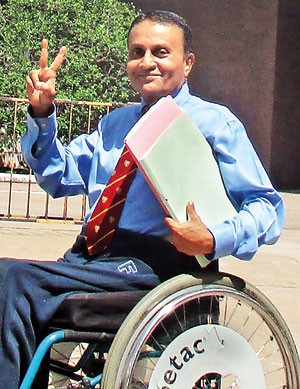News
State’s disregard for the disabled invites SC censure
In a landmark judgement, the Supreme Court (SC) this week ruled that the Fundamental Rights (FR) guaranteed by Article 12 (1) of the Constitution to persons with disabilities had been violated by the State and its agencies.

Dr. Ajith Perera shows the victory sign as he emerges from the Supreme Court on Thursday
A 3-Judge SC Bench comprising Justices Prasanna Jayawardena, Vijith K. Malalgoda and Murdu Fernando issued a direction to eight Government institutions, including six ministries, to take effective measures to ensure the provisions of Disabled Persons (Accessibility) Regulations No.1 of 2006 are implemented and complied with forthwith, in respect of public buildings, public spaces and where common services are available.
The direction was issued to all institutions coming under the purview of the Minister of Social Services & Social Welfare and the Chairman of the National Council for Persons with Disabilities, Minister of Provincial Councils, Local Government & Sports, Minister of Housing & Construction, Minister of Megapolis & Western Development, Minister of Education, Minister of Justice & Prison Reforms, Sri Lanka Tourism Development Authority and the Urban Development Authority.
The SC made this order pursuant to a FR petition filed by Dr Ajith C.S. Perera. The court also ordered the State to pay the Petitioner Rs. 50,000 on account of legal costs.
In its judgement, the Court stressed that the “stark truth” is that there has been large scale non-compliance with the Regulations, despite the passage of about 13 years since the Regulations were made, and the passage of more than one-and-a-half years after the expiry of the time limit allowed for compliance.
The Court observed that the fault lies not in the regulations, but in compliance by the State and its agencies, with the regulations.
The Court directed the 1st to 8th respondents and secretaries to the ministries of the 1st to 6th respondents to forthwith issue circulars or directions to all local authorities, Government departments, Boards, statutory institutions, State agencies and public officers under the purview or control of the 1st to 8th Respondents, specifying that: (a) Approvals for construction or renovation of public buildings, public places and places where common services are available [as defined in clause 10 of the Disabled Persons (Accessibility) Regulations No. 1 of 2006] shall not be granted unless the building plans, designs and drawing relating to such construction or renovation, comply with the provisions of the Disabled Persons (Accessibility) Regulations No. 1 of 2006; (b) Certificates of conformity in respect of public buildings, public places and places where common services are available [as defined in clause 10 of the Disabled Persons (Accessibility) Regulations No. 1 of 2006] shall not be issued unless it has been established, after inspection, that such buildings and places, comply with the provisions of the Disabled Persons (Accessibility) Regulations No. 1 of 2006.
“However, if valid practical and/or budgetary considerations necessitate that such implementation and compliance in an existing public building, public place and place where common services are available [as defined in clause 10 of the Disabled Persons (Accessibility) Regulations No. 1 of 2006], be temporarily deferred, that may be done, provided that, in such instances, implementation and compliance is achieved at the earliest possible opportunity,” the Court noted.
The Court further directed the respondents to take appropriate follow-up action, on a continuing and regular basis, to monitor compliance with the subject matter of directions given by local authorities, Government departments, boards, statutory institutions, State agencies and public officers coming under their purview or control.
A further direction was issued to the respondents to initiate disciplinary proceedings where appropriate against public officers who are found to have granted approvals or issued certificates of conformity in breach of and/or in violation of and/or in disregard of the provisions of the Disabled Persons (Accessibility) Regulations No. 1 of 2006.
The SC observed that failure to comply could entail the liability to be prosecuted in the High Court or Magistrate’s Court, for the commission of an offence under the Act and, if found guilty, be liable to punishment, as set out in the Act.
It directed the National Council for Persons with Disabilities acting together with the National Secretariat for Persons with Disabilities to carry out an appropriate and effective public awareness programme designed to increase public awareness of the relevant provisions of the Protection of the Rights of Persons with Disabilities Act No. 28 of 1996 Act and mandatory requirements of the Disabled Persons (Accessibility) Regulations No. 1 of 2006.
Petitioner, Dr Perera, a Chartered Chemist, was a senior company manager and an accredited Test umpire. He was gravely injured and left with paraplegia, when a wayside tree fell on to his car in 1992. Since then, the petitioner has actively campaigned to resolve the difficulties which physically disabled people face in day-to-day life in the community. In 2005, the petitioner founded an organisation named “IDIRIYA”. The organisation works on “disability related access issues” which affect physically disabled people in day-to-day life.
Dr Perera appeared in person, while Senior State Counsel Rajitha Perera appeared for the Attorney General.

